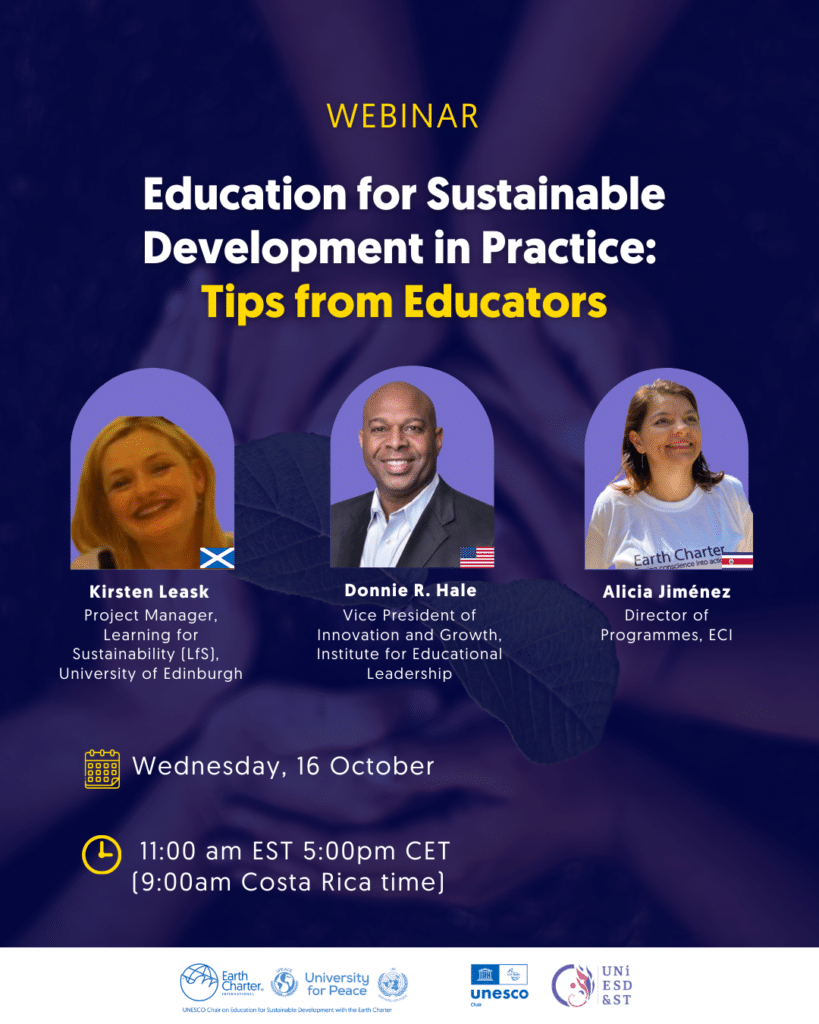Date and time: Wednesday 16 October, 11:00am EST; 5:00pm CET (9:00am Costa Rica time)
Earth Charter International and the UNITWIN Network on ESD and Social Transformation, are organizing a series of webinars to bring together educators from different contexts to share good practices on education for sustainable development.
The objective is to open a space for sharing and learning about how education for sustainability can be put into practice and get inspiration from concrete actions, from primary and secondary to higher education, in formal or non formal settings and from different cultural contexts.

This webinar will bring together two experts in education strategies and policies, which will provide examples of how different groups and stakeholders can come together to support government’s efforts to infuse sustainability in education, emphasizing the social and environmental dimensions, and enhancing the quality of education.
Kirsten Leask will share the story of Learning for Sustainability strategy and policy of Scotland, and how this has been a collaborative effort to put education for sustainable development, global citizenship and outdoor education into practice.
Donnie R. Hale will share his experience in different organizations, from primary school to a think tank organization, to further education inclusiveness, community engagement, active citizenship and leadership across the United States.
This webinar is organized as part of our UNESCO Chair on Education for Sustainable Development with the Earth Charter, which develops education programmes and research in the field of education, sustainability, as well as values and ethics.
Speakers:
Donnie R. Hale (USA): He serves as the Vice President of Innovation and Growth for the Institute for Educational Leadership (IEL). Previously, he was the Southern Regional Director for the Coalition for Community Schools, house at IEL. He is responsible for supporting leaders and networks, coaching and professional development, and building capacity for community schools to positively impact youth and families. Dr. Hale brings 20+ years of experience in higher education, teaching, research, coaching, community building, and relationship cultivation. He previously served as Executive Director for Community Engagement and Strategic Partnership at Florida Memorial University (HBCU), Assistant Director for the University of Central Florida – Center for Community Schools, and Director of The Education Effect (University-Assisted Community School Partnership) at Florida International University, and Assistant Professor of Education at Carroll University in Waukesha, WI. His body of work is focused on race, equity, educational opportunity, college access and human development. His teaching experience has been in areas of sociology, education, African American history, and cultural diversity.
Kirsten Leask (Scotland): She is Project Manager (Connecting Classrooms), Learning for Sustainability (LfS) Scotland, at the Moray House School of Education and Sport, IETL, of the University of Edinburgh. She joined LfS Scotland as a member of the Steering Group in 2013 and as Project Manager in 2019: initially managing the Connecting Classrooms through Global Learning programme in partnership with IDEAS and the Scotland Malawi Partnership on behalf of the British Council and the FCDO. Originally a secondary teacher, she has worked on sustainability-related learning initiatives and for various NGOs for the past 20 years. She’s involved with Scotland’s UN University Regional Centre of Expertise in Education for Sustainable Development.
Moderator – Alicia Jimenez (Costa Rica): Director of Programmes, Earth Charter International. Costa Rica. She is a biologist from the University of Costa Rica, with a MSc in Resource Development from Michigan State University in the United States and a PhD on Education from La Salle University, Costa Rica. In 2006, she joined the ECI, where she is involved with the Secretariat’s projects on education for sustainable development, facilitating courses, workshops, participating in research and writing projects. She has co-written two books, edited two books and written a number of articles and book chapters on ESD topics.






